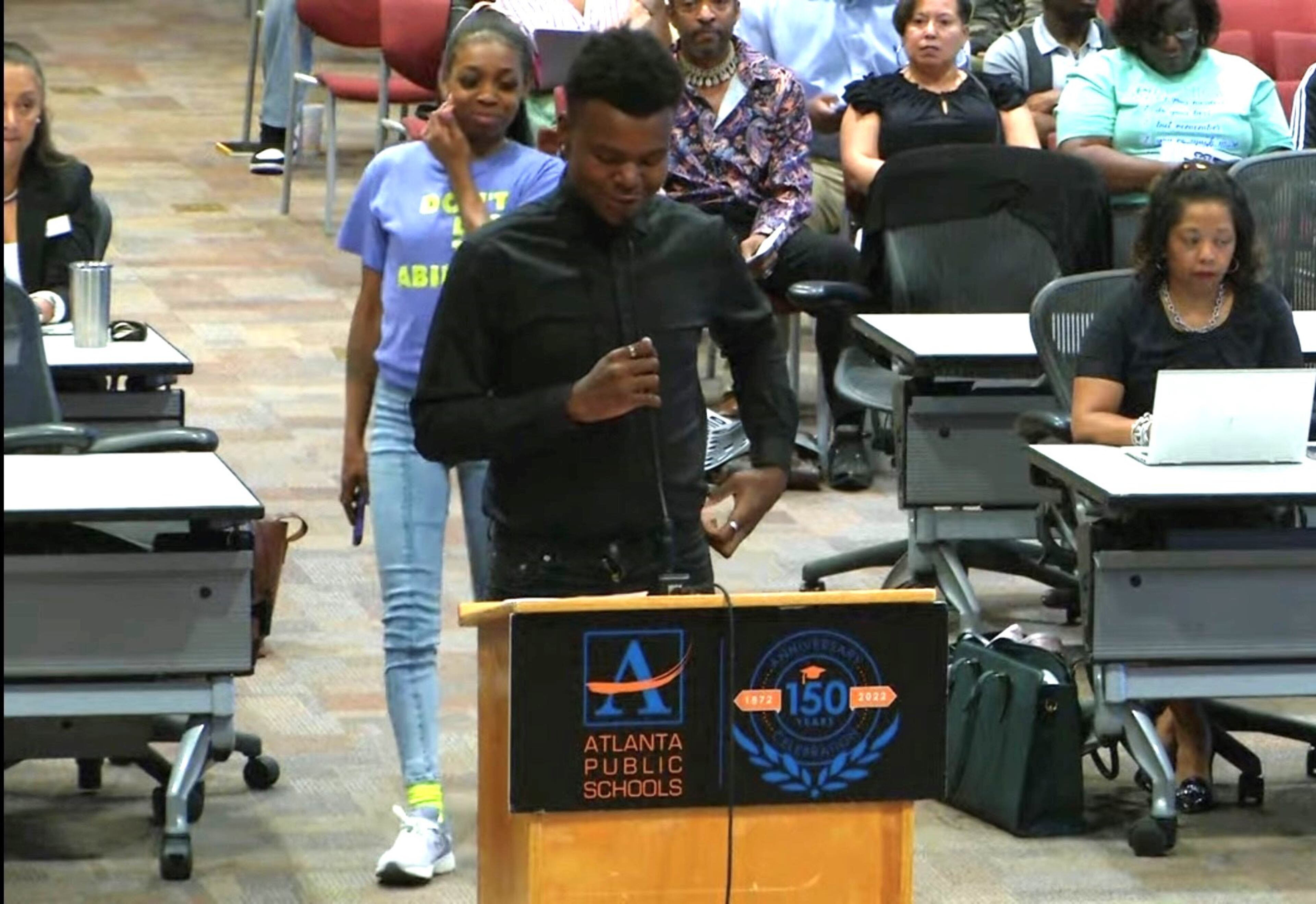Atlanta Public Schools to pilot student-led mental health board

Iman Cook was nervous as he addressed the Atlanta school board during a recent meeting. The 17-year-old Mays High School sophomore spoke about how mental health struggles can affect students’ academic performance and well-being.
He made a request to the district’s elected officials.
“I am standing here before you this evening to advocate for the establishment of a student-led mental health community board within our district,” he said.
Public comment periods during school board meetings can be awkward. Board members don’t respond directly to commenters, who only have two minutes to talk. But officials with Atlanta Public Schools were listening. After he spoke, they met with Iman and some other students and agreed to pilot a student-led mental health board during the 2024-25 school year.
The APS pilot will involve five schools, which haven’t been named yet. Each participating school will select a student and staff liaison to serve on the board. The goal is to have one districtwide event around mental health per semester. Each event will be student-led with staff standing by to help with elevated mental health situations. If APS is happy with the pilot, the hope is to expand the program.
Research shows rates of anxiety and depression among young people increased after the first wave of the COVID-19 pandemic. Youth suicide rates also increased during that time, according to federal data. Half of caregivers who died in the U.S. due to COVID-19 lived in six states. Georgia was one of them.

Cook said his mental health suffered shortly after the death of his father two years ago.
“I was starting high school, and I was just struggling with my mental health,” he said. “I didn’t have any help from the school, literally anything. When I would try, I wouldn’t get (any) help.”
Cook volunteers with Our Turn, a national group that mobilizes students to advocate for themselves. Mental health is one of the group’s policy priorities. Cook expressed his concerns about a lack of mental health resources in schools to the group.
Evan Malbrough, who manages student organizing at Our Turn’s Atlanta chapter, worked with Cook on developing the idea for a student-led mental health board before the school board meeting.
“A lot of that (plan) came from the blog post he posted with Our Turn,” Malbrough said.
Malbrough said, as far as he knows, APS will be the first school district nationally to implement a program like this.
Anne Cornell is the chief clinical officer at CHRIS 180 in Atlanta, which partners with some APS schools and other Georgia districts to provide mental health and counseling services. Cornell said establishing a student-led board is an important step toward helping students identify their own needs.
“It’s a recognition of, one, mental health is really important,” she said. “Two, ‘We’re struggling and we want to have mental health services available to us in a really accessible, timely way,’ and they’re and they’re making their voices heard.”
Cook said he hopes the district will listen to students and address their needs, such as increasing the number of available counselors.
“Students my age deal with things like depression, anxiety and those kind of things,” he said in an interview. “At my school specifically, I believe we have a therapist ... but you have to think about it, there are ... about 1,000 students at my school. So that therapist can only get to so many students a week.”
Some health professionals believe each school should have at least one psychologist for every 500 students. In 2022, the ratio was 1 for every 6,390 public school students in Georgia, according to a report that year by a group of mental health agencies.
Cornell thinks a student-led board is a good idea because it would give students a forum to share their experiences and come up with answers.
“Some solutions work in different schools, different cultures, and we have to be open to all of that,” she said. “It’s not a one-size-fits-all, cookie-cutter approach. We really do have to be individualistic and make schools as safe as we can.”
Neev Seedani, a former Gwinnett student who is a fellow with Our Turn and helped shape plans for the APS student board, said participation shouldn’t be limited to “A” students.
“It doesn’t just include high achievers,” he said. “We don’t want students who are maintaining 4.0 GPAs. Sure we can have a couple in there. The point is, we want students who truly face these issues, and they don’t have to have some crazy resume (to participate).”



